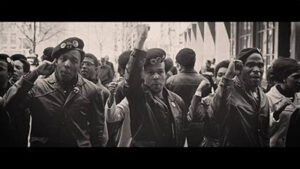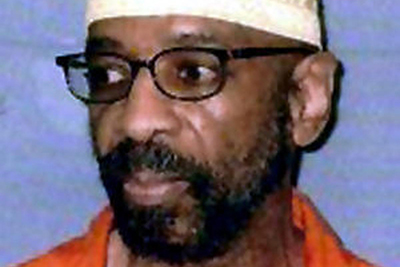
The Black Unity Council founder who was part of the New Afrikan liberation movement was a catalyst in the movement to abolish solitary confinement and other inhumane treatment of prisoners.
Written By Bruce C.T. Wright
(Source NewsOne):
Russell “Maroon” Shoatz, a former Black Liberation Army soldier and ex-Black Panther who became an in-fluential prison abolitionist while in solitary confinement for more than two decades during a nearly 50-year prison sentence, has died. He was 78 years old.
The Abolitionist Law Center — a group that successfully worked to help get Maroon out of solitary confinement — confirmed the death.
The Abolitionist Law Center said he died in his sister’s home 52 days after he gained his freedom from prison on Oct. 26 following a compassionate re-lease because of his advanced stage of colorectal cancer, the presumed cause of his death.
A father, grandfather and great-grandfather, Maroon was widely described as a political prisoner over the details of his murder conviction in 1970 for killing one police officer and injuring another in Philadelphia.
While behind bars, Maroon — whose nickname came from his two successful escapes from prison — ultimately became an outspoken advocate for prisoners’ rights. But when Maroon became president of the Pennsylvania Association Of Lifers (PAL) in 1983, prison officials remanded him to solitary confinement, a place where he would spend the better part of the next 23 years. The group was actively lobbying to abolish life-without-parole sentences.
It took Maroon suing state corrections officials for him to finally be returned to general population in 2014.
How Maroon got to prison
A blog devoted to raising awareness of Maroon’s imprisonment recounted the events that led to the incarceration of the Black Unity Council founder who was also a part of the New Afrikan liberation movement. The police shooting for which Maroon was convicted was described as “retaliatory” after Philadelphia police killed a Black child in 1970. Officer Frank Von Coln was killed in a shooting that wounded another officer, prompting the police to raid the Black Panthers headquarters in North Philadelphia and arrest and charge Maroon along with four others who collectively became known as the “Philly Five.”
Two years later, the police apprehended Maroon and put him on trial for Von Coln’s killing.
Prison sentence
Maroon was sentenced to life in prison without the possibility of parole in 1972 and subsequently escaped in 1977 and again in 1980. After he was re-sentenced, Maroon was put in solitary confinement in 1982. That same year, after being released into the prison’s general population, Maroon began associating with PAL, described in his lawsuit against state corrections officials as “an officially-approved prison organization dedicated to advancing the interests of life-sentenced prisoners.”
Maroon accused prison officials of placing him in solitary confinement because of his involvement with PAL. He claimed that when he was later transferred into the federal prison system to serve time in general population in the infamous Leavenworth facility in Kansas from 1989 to 1991, he was “an exemplary prisoner and did not commit any prison rule infractions.” But when he was transferred back into the state system in Pennsylvania, he was immediately placed back in solitary confinement and stayed there for nearly the next 23 years.
Lawsuit
The 2013 lawsuit provided a glimpse into Maroon’s life in prison, where he “had an impeccable disciplinary record” with only one blemish: for covering a vent in his cell that was blowing cold air in an attempt to stay warm. The lawsuit was seen as a last resort to get Maroon back into general population and out of solitary confinement, a punishment that human rights and prison experts have called inhumane and medical experts say can foster anxiety, depression, suicidal thoughts and psychosis.
On Feb. 20, 2014, Maroon was officially released from solitary confinement and back into general population.
“My father being released from solitary confinement is proof of the power of people organizing against injustice, and the importance of building strong coalitions,” Maroon’s son, Russell Shoatz III, said at the time.
In July 2016, Maroon won a $99,000 settlement that also guaranteed he would never return to solitary confinement.
Prison release
Maroon’s cancer was diagnosed while he was in prison, a place that his son blamed for causing the terminal illness. Shoatz III said his father’s condition was “evidence” of how prisons mistreat aging inmates, in particular.
“What’s in the transcripts are the evidence that the prisons don’t have the capabilities to take care not just of their healthy prisoners, they definitely don’t have the ability to take care of their geriatric prisoners, and that they have effectively killed my father,” Shoatz III said as his father was released in October.
Legacy
Maroon’s notable campaign against solitary confinement and life prison sentences without a chance for parole has been credited for pushing forward the movement for humane treatment of prisoners. Bret Grote, the executive director of the Abolitionist Law Center, hailed Maroon’s release from solitary confinement as “a significant victory for a growing people’s movement against solitary confinement and the human rights violations inherent in mass incarceration.”
In prophetic words spoken in 1995, Maroon seemed to predict not just his future but the effect it would have on generations to come:
“Rest easy fighting maroons. There are many now and to come who will derive inspiration from your valorous examples — inspiration that will ‘arm their spirits’ to fight the good fight. … til victory or death!!!”

